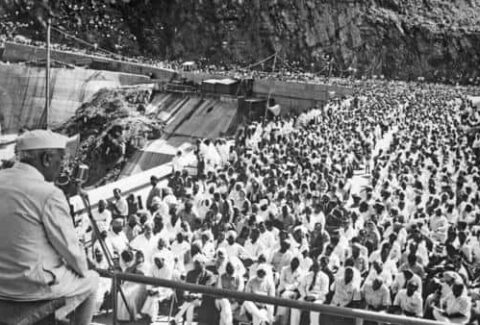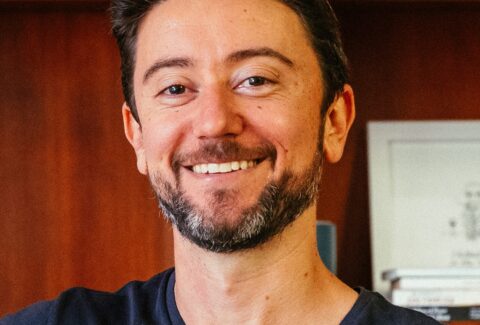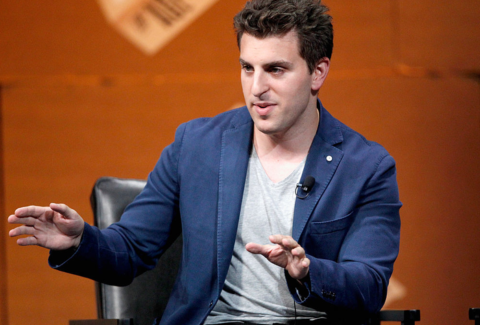Bezos’ idea of a ‘perfect meeting’
Welcome to the forty-fifth edition of ‘3-2-1 by Story Rules‘.
A newsletter recommending good examples of storytelling across:
- 3 tweets
- 2 articles, and
- 1 long-form content piece
Let’s dive in.
🐦 3 Tweets of the week

Bookwriting follows a brutal power law. If you want to write a book, don’t do it for the money.

Take that Malthus!

Hilarious!
📄 2 Articles of the week
a. ’66 Good News Stories You Didn’t Hear About in 2023′ by Angus Hervey
A great way to start 2024 – with these uplifting stats and stories about how the world is getting better bit by bit (emphasis mine):
Global poverty reduction is back on track
After the setbacks of the pandemic, the World Bank said that a majority of low and middle income countries will see poverty decline in 2023, and more than half will reach a lower poverty rate than in 2019. The two standouts are India, which has lifted hundreds of millions of people out poverty in the last two decades, and Indonesia, which has reduced its share of people living on less than $3.20 a day from 61% in 2002 to 16% in 2022.
The US is doing remarkably well, beating the dire predictions of 2022. But some people are still not satisfied:
“The United States pulled off an economic miracle
In 2022 economists predicted with 100% certainty that the US was going to enter a recession within a year. It didn’t happen. GDP growth is now the fastest of all advanced economies, 14 million jobs have been created under the current administration, unemployment is at its lowest since WW2, and new business formation rates are at record highs. Inflation is almost back down to pre-pandemic levels, wages are above pre-pandemic levels (accounting for inflation), and more than a third of the rise in economic inequality between 1979 and 2019 has been reversed. Average wealth has climbed by over $50,000 per household since 2020, and doubled for Americans aged 18-34, home ownership for GenZ is higher than it was for Millennials and GenX at this point in their lives, and the annual deficit is trillions of dollars lower than it was in 2020.
Everyone’s still pissed off though.”
Also, check out the fabulous graph on fossil fuel usage in the article.
b. ‘Putting the Democratic Crisis in Perspective’ by Janan Ganesh (Financial Times)
Janan Ganesh starts by setting the context – of an action-packed year for voters worldwide in 2024:
It is bad manners to pre-empt the FT’s annual prize for individual achievement, but the Person of 2024 will be “the voter”. Among the democracies that are due to choose a national government this year are the world’s largest (India) and mightiest (the US), as well as the one that fancies itself the most established (Britain). In elections elsewhere, the stakes range from the municipal (Brazil) to the pan-continental (the European parliament). The people of Taiwan and conceivably even Ukraine, those front lines of the free world, will also exercise their right to decide who leads them.
Of late, it’s become fashionable to state that the world is becoming less democratic, given the rise of strongmen leaders across countries like China, India, the US, Turkey, Israel, and Brazil.
But Janan does some smart widening of the frame (emphasis mine):
The number of democracies in the world, the quality of the democracy within them, the share of humankind that lives under democratic rule: to the extent that such things are measurable, all three have been getting worse over the past decade or so. But the baseline is the historic, almost delirious peak of democratic expansion in the afterglow of the cold war. Widen the timeframe a bit, and the present crisis looks more like a correction. The world is still incomparably freer than it was at the midpoint of the last century, when 1.7bn of the planet’s 2.5bn lived in “closed autocracies”. Now, 2bn out of 8bn do.
In sum, the article says – the present set of circumstances might just be a correction in a long-term trend toward more democracy.
Perhaps it could have begun (or ended) with this quote: “Democracy: The reports of my death are greatly exaggerated”
Hat/Tip: I found this via this tweet by Karthik Srinivasan, who also posted an image of the article on Twitter for those who may not be able to access the website.
c. Bonus: Why Dunki didn’t work for me
I wrote a post on LinkedIn on why the movie ‘Dunki’ did not work for me.
🎧 1 long-form listen of the week
a. Jeff Bezos: Amazon and Blue Origin | Lex Fridman Podcast
Lex Fridman has had a galaxy of superstars on his podcast – Elon Musk, Sam Altman, Vitalik Buterin, and now, Jeff Bezos.
The conversation is dominated by Blue Origin, Bezos’ space exploration venture. But there’s also a fair bit of discussion on Amazon (duh) and Bezos’ growing years.
Honestly, a lot of the space-related content was too rocket-sciency for me! But some parts were fascinating. For example, I love the way Bezos puts the lunar landing achievement in context:
Lex Fridman: I read that you fell in love with the idea of space and space exploration when you were five, watching Neil Armstrong walking on the moon. So, let me ask you to look back at the historical context and impact of that. So, the space race from 1957 to 1969 between the Soviet Union and the US was, in many ways, epic. It was a rapid sequence of dramatic events. First satellite to space, first human to space, first spacewalk, first uncrewed landing on the moon. Then, some failures, explosions, deaths on both sides actually. And then, the first human walking on the moon. What are some of the more inspiring moments or insights you take away from that time, those few years at just 12 years?
Jeff Bezos: Well, I mean there’s so much inspiring there. One of the great things to take away from that, one of the great von Braun quotes is, “I have come to use the word impossible with great caution.” And so, that’s kind of the big story of Apollo is that going to the moon was literally an analogy that people used for something that’s impossible. “Oh, yeah, you’ll do that when men walk on the moon.” And of course, it finally happened. So, I think it was pulled forward in time because of the space race. I think with the geopolitical implications and how much resource was put into it. At the peak, that program was spending 2% or 3% of GDP on the Apollo program. So, much resource. I think it was pulled forward in time. We kind of did it ahead of when we, quote, unquote, should have done it. And so, in that way, it’s also a technical marvel. I mean it’s truly incredible. It’s the 20th century version of building the pyramids or something. It’s an achievement that because it was pulled forward in time and because it did something that had previously been thought impossible, it rightly deserves its place in the pantheon of great human achievements.
Bezos’ vision is to see a trillion humans in the solar system, across giant space stations:
Lex Fridman: When you look up at the stars and think big, what do you hope is the future of humanity, hundreds, thousands of years from now out in space?
Jeff Bezos: I would love to see a trillion humans living in the solar system. If we had a trillion humans, we would have, at any given time, 1,000 Mozarts and 1,000 Einsteins. That our solar system would be full of life and intelligence and energy. And we can easily support a civilization that large with all of the resources in the solar system.
Lex Fridman: So, what do you think that looks like? Giant space stations?
Jeff Bezos: Yeah, the only way to get to that vision is with giant space stations. The planetary surfaces are just way too small. So, I mean, unless you turn them into giant space stations or something. But yeah, we will take materials from the moon and from near-Earth objects and from the asteroid belt and so on, and we’ll build giant O’Neill style colonies and people will live in those.
This story – about how an interaction with a Sri Lankan student convinced Bezos that theoretical physics was not for him – is fascinating:
Jeff Bezos: Theoretical physics is… one of those things where your brain has to be wired in a certain way. And there was a guy named… Yosanta (Yasantha). And Yosanta was from Sri Lanka, and he was one of the most brilliant people I’d ever met. My friend Joe and I were working on a very difficult partial differential equations problem set one night. And there was one problem that we worked on for three hours and we made no headway whatsoever. And we looked up at each other at the same time and we said, “Yosanta.” So, we went to Yosanta’s dorm room and he was there. He was almost always there. And we said, “Yosanta, we’re having trouble solving this partial differential equation. Would you mind taking a look?” And he said, “Of course.” By the way, he was the most humble, most kind person. And so, he looked at our problem and he stared at it for just a few seconds, maybe 10 seconds, and he said, “cosine.” And I said, “What do you mean, Yosanta? What do you mean cosine?” He said, “That’s the answer.” And I said, “No, no, no, come on.” And he said, “Let me show you.” And he took out some paper and he wrote down three pages of equations, everything canceled out, and the answer was cosine. And I said, “Yosanta, did you do that in your head?” And he said, “Oh, no. That would be impossible. A few years ago I solved a similar problem and I could map this problem onto that problem, and then it was immediately obvious that the answer was cosine.” You have an experience like that, you realize maybe being a theoretical physicist isn’t what the universe wants you to be. And so, I switched to computer science and that worked out really well for me.
I love this quote about intelligence:
Bezos: There are 1,000 ways to be smart, by the way, and… when I go around and I meet people, I’m always looking for the way that they’re smart.
Coming to his Amazon experiences, Bezos cautions us to have a “sceptical view of proxies” (proxy metrics):
Bezos: you’ve got to constantly be on guard and it’s very, very common. This is a nuanced problem. It’s very common, especially in large companies, that they’re managing to metrics that they don’t really understand. They don’t really know why they exist, and the world may have shifted out from under them a little and the metrics are no longer as relevant as they were when somebody 10 years earlier invented the metric.
And now, for the best part: Bezos’ idea of a perfect meeting (emphasis mine):
Bezos: My meetings often go longer than I planned for them to because I believe in wandering. My perfect meeting starts with a crisp document. So the document should be written with such clarity that it’s like angels singing from on high. I like a crisp document and a messy meeting. And so the meeting is about asking questions that nobody knows the answer to and trying to wander your way to a solution. And when that happens just right, it makes all the other meetings worthwhile. It feels good. It has a kind of beauty to it. It has an aesthetic beauty to it, and you get real breakthroughs in meetings like that.
This conversation is a goldmine of insights.
That’s all from this week’s edition.







